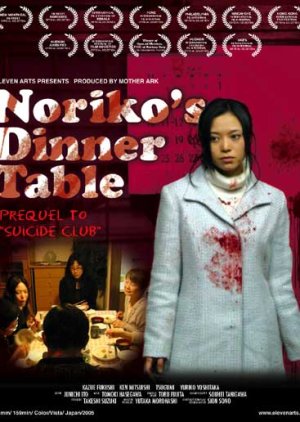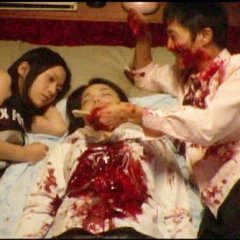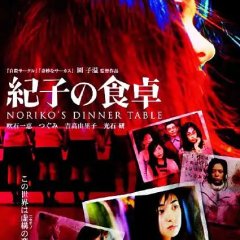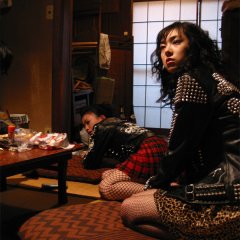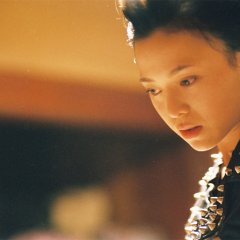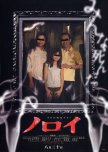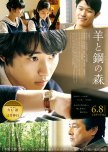A family portrait from contemporary Japan about the generational rebellion of otherwise obedient daughters - since Nagisa Oshima started making movies, it seems that a strong generational conflict slumbers under the surface of Japanese society, a conflict which is the prime mover behind Sono's plot as well. In the movie, which oscillates between psychothriller and Bildungsfilm, sisters Noriko and Yuka share an adolescent distaste for their father for his rituals and values. Not even their mother's love can protect them from ending up under the sway of a sect. The older Noriko is the first to leave her parents' house. She meets a young woman named Kumiko in a chat room and soon takes off for Tokyo to visit her. The younger Yuka follows within a few months. With Kumiko, they undergo complete transformation - they have new names and new lives, but they're not the only ones. Their father is determined to get them back, but he comes up against a conspiracy that proves difficult to penetrate. Edit Translation
- English
- Español
- magyar / magyar nyelv
- dansk
- Native Title: 紀子の食卓
- Also Known As: Noriko no Shokutaku
- Screenwriter & Director: Sono Sion
- Genres: Horror, Psychological, Youth, Drama
Cast & Credits
- Fukiishi Kazue Main Role
- Yoshitaka YurikoShimabara YukaSupport Role
- Mitsuishi KenShimabara TetsuzoSupport Role
- Kitagawa Takako[Kumiko's mother]Support Role
- Mitsuya YokoMikanSupport Role
- Otake TsugumiKumiko / "Ueno 54"Support Role
Reviews
Noriko’s Dinner Table, opposed to its predecessor, is no horror movie, but a thriller. Its complex and witty story is unraveled slowly throughout the movie by having several people delineate their perspectives and contribute to a giant jigsaw.
Generally Noriko’s Dinner Table manages to reinvent itself multiple times and lets new questions arise while resolving past subjects.
Phenomena of today’s society, such as human coldness and sense of self, are being explicitly, sometimes indirectly, addressed. “Who are we?” “How do we behave towards other people?”
The actors are well chosen and substantiate a harmonious picture; their performances are convincing and earnest to the degree that it’s possible to sympathise.
The music is befitting, but not memorable.
Noriko’s Dinner Table has a high rewatch value, due to the way it’s being told, its complexity and occasional absurdness. (I stopped frequently, scribbled some notes and watched again.)
In case you are looking for a cleverly told, thought-provoking, engaging movie, which keeps you entertained- – it’s a movie definitely worth checking out. Nevertheless let me warn you: It does not fail to establish creepiness equivalent to “Suicide Club”.

She runs away to Tokyo and contacts Ueno Station #54, an online friend she made on Haikyo.com, a website where she found solace as it was the only place where she could talk about the ditsy rebelious side of hers, the side which doesn't want to embrace the peacefulness of Tokoyama. She gets embroiled in an absurd business which offers services to roleplay as family members, roles that nobody else wants to play, and in the process, loses “herself” completely.
“Everyone wants to be champagne, not the glass. A flower, not the vase. But the world needs glasses and vases. These roles need to be fulfilled.”
We are all playing certain roles in our life, we are playing daughters, sisters, mothers, brothers, father; we are playing at being a family. While the first half of Noriko’s Dinner Table is mildly suspenseful and mostly just confusing, the latter half is a psychological horror which propounds the fluidity of our identies or rather, it's fragility, which can mould and morph or shatter completely. Today she might be Noriko, tomorrow she is Mitsuko, then she is somebody else and then Noriko again.
Moreover, Noriko's Dinner Table is a social commentary on suicide and the ramifications of the internet. The film is an onslaught of depression and loneliness which has no cause and does, because why should Noriko feel so unhomely is a place which is so tranquil, with a family that is so loving? Is it because her father simply refuses to cover the story of the 54 teenage girls who suicided at the station and continues to print happy stories on the Tokoyama Public Library and it's cacti gardens.
This film, like any other Sono Sion film, is like the gamma waves that are unfoundedly believed to stretch our brain. Unlike gamma waves, Noriko's Dinner Table will stretch your brain.
There are certain Sono Sion movie moments that tend to stick in your brain and I'm not talking about the blood bath or the shocking complacency with which it is shown. In Strange Circus it was the moment when the girl was sitting in the cello; Noriko's Dinner Table has such unforgettable moments, for me, it was when Tetsuzo looks at his daughters through a crack in the wardrobe, at girls who aren't his daughters and somehow still are.
The most powerful juxtaposition in the movie was perhaps that of Noriko and Kumiko, the former who was once a girl brought up with love but feels hollow and eventually becomes a spectre of herself and the latter being a girl abandoned in a locker, who is only capable of creating an illusion of happiness but bathes in her chameleon personality. Noriko who ultimately becomes Noriko, and Kumiko who is still stuck in roleplay.
“If some people are lions, others must be rabbits. Some must die for the rest to truly live.” So let's be rabbits for a while, says Yuka, as she is surrounded by her faux family. Or perhaps they are her real family. Life is a strange illusion and Sono Sion asks a lot of questions in this tragic and incendiary movie, some which go unanswered, some which don't have one and some which are indecipherable.

